Human Rights and Environmental Due Diligence (HREDD) is the talk of the town after the German Supply Chain Due Diligence Act got passed in 2021. With each year, the topic is emerging and taking its due attention from all the stakeholders-the brands and its different level of suppliers. To address this, GIZ is actively preparing the trainers of the RMG factories, consultancy firms, brands, different industry association representatives since last year. To continue the efforts, the Initiative for Global Solidarity (IGS), GIZ, in association with B+HR Asia, UNDP rolled out its latest two days ToT (Training of Trainers) training programme on HREDD in the lens of Gender Responsiveness on 2 and 3 July at Hotel Amari, Dhaka.
The Train the Trainers aimed to equip participants with training tools and techniques while creating awareness and building their capacities on global and regional developments to promote responsible business conduct.
In particular, the training focused on the European Union’s Corporate Sustainability Due Diligence Directive (CS3D) and its impact on Bangladesh’s garment industry.
Conducting through an interactive format with practical insights and case studies, the training focused on human rights and environmental due diligence through a gender lens.
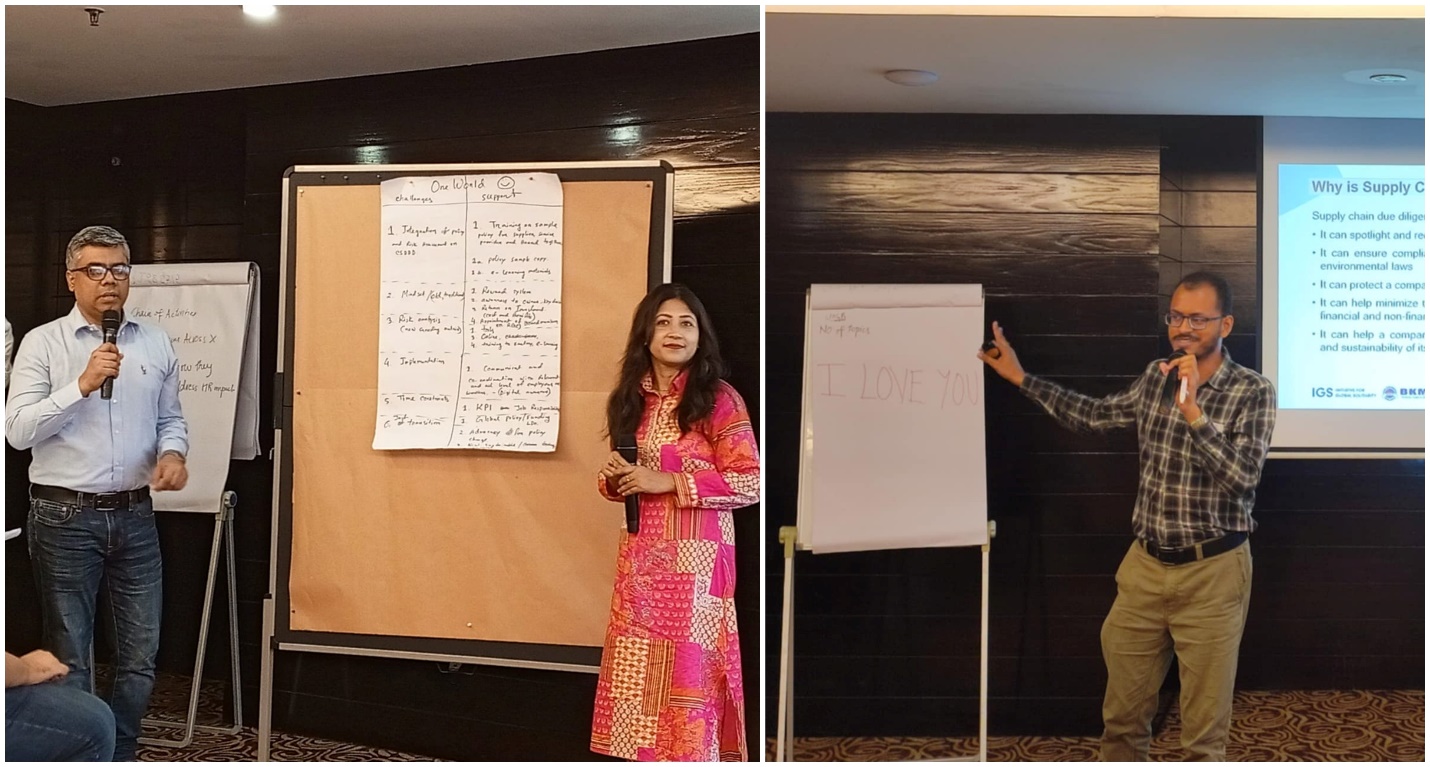
Figure 2: The ToT training had an interactive segment where the participants had to present a specific topic from the previous HREDD ToT. After the presentation, they got constructive feedbacks from the master trainers and other participants. There was interactive group activity segment which helped the trainees to brainstorm on specific topics.
The two international trainers were Harpreet Kaur, Business and Human Rights Specialist, UNDP and Shubhabrata Roy, Founder, BIAS PVT. Ltd. Ms. Harpreet focused more on the technical parts of the HREDD and Mr. Shubhabrata guided the participants to see the matter in a gender responsive way.
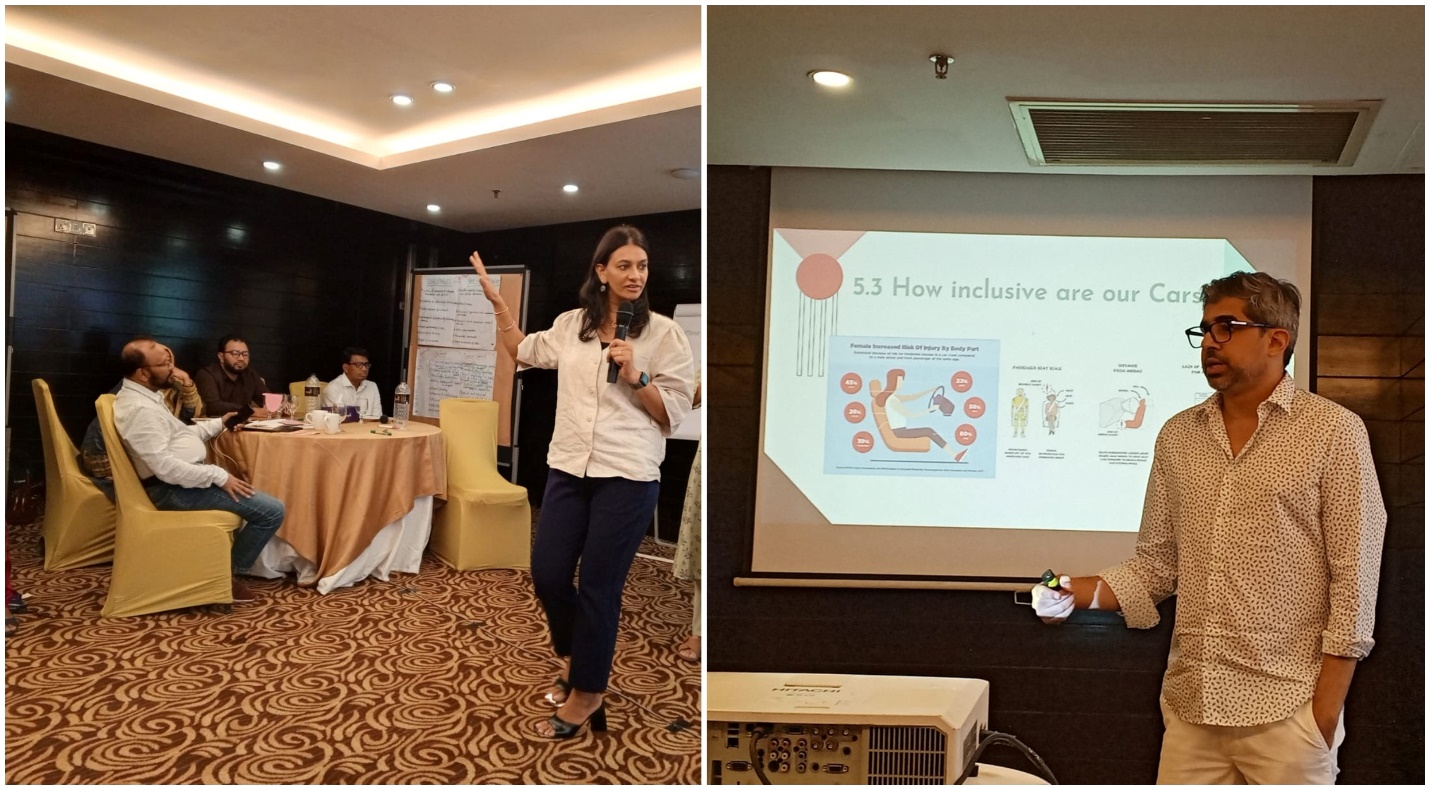
Figure 3: Harpreet Kaur, Business and Human Rights Specialist, UNDP and Shubhabrata Roy, Founder, BIAS PVT. Ltd. while delivering their modules.
Participants were the trainers who have previously participated in the ToT on Human Rights and Environmental Due Diligence training provided by GIZ, who have background in social and environmental auditing, experience in relevant fields such as Human Resource Management, Compliance, and Sustainability, training and auditing.
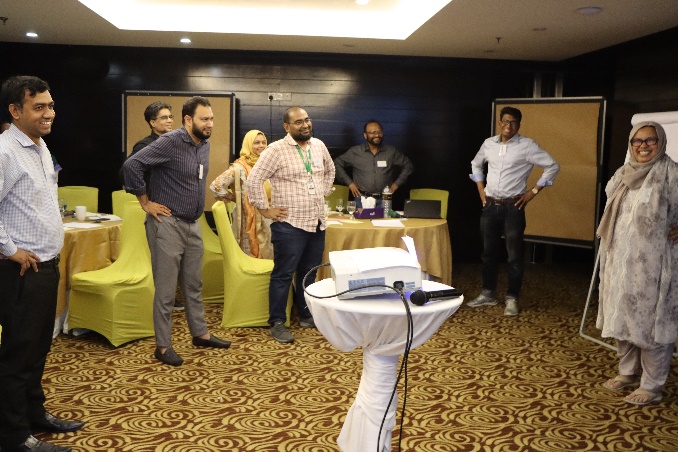 |
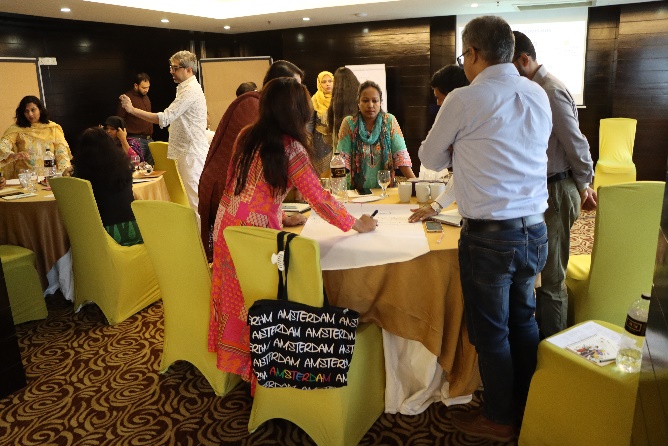 |
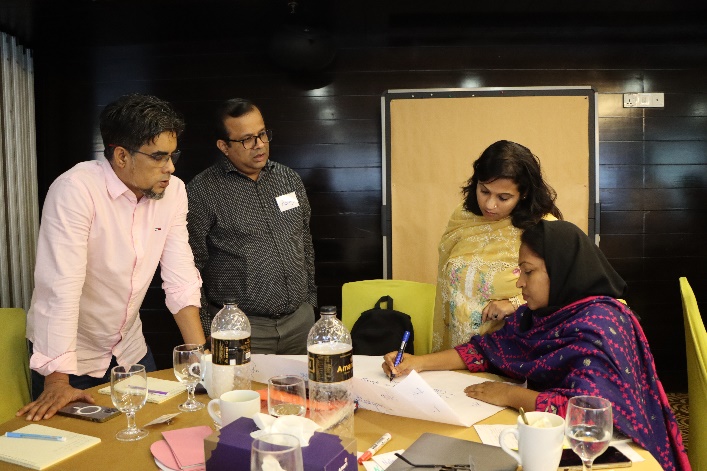 |
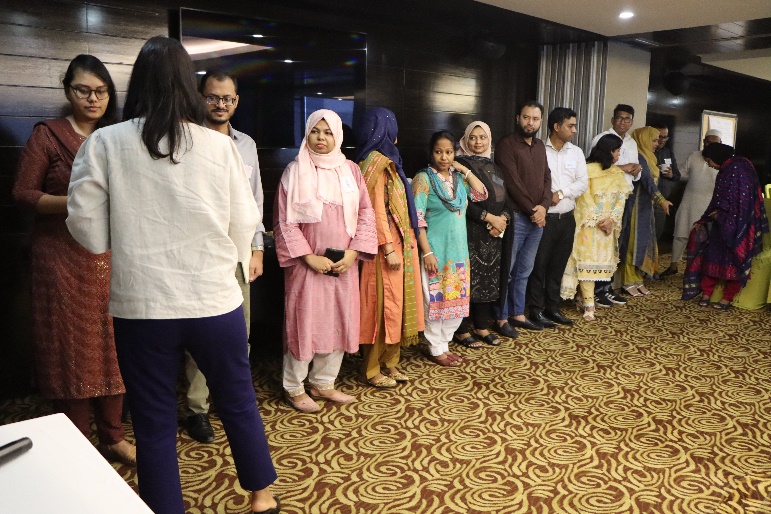 |
Figure 4: Participants are engaged in different group works and ice-breaking activities.
Regarding the training, Ms. Nazia Sharmin, Project Support Executive, Primark said, “Attending the two-day interactive and engaging Gender-Responsive Human Rights Due Diligence Training of Trainers session was an enlightening experience that provided valuable insights into understanding our subconscious gender biases. The session skillfully addressed gender-specific issues and effectively integrated gender perspectives through compelling examples. I am confident that the knowledge gained will greatly enhance my ability to educate diverse audience.”
In this rising concept of gender responsive HREDD, gender biasness or discrimination is one of the key concerns. Women and gender-diverse individuals often face unique challenges in various contexts, including the workplace, access to resources, social services, economic opportunities, gender-based violence, unequal access to benefits etc. Moreover, gender-specific risks may be overlooked in traditional HREDD processes.
Asim Mondal, the Master Trainer of GIZ’s previous HREDD and SDM (Sustainability Data Management) ToT said, “Gender responsive HREDD is crucial for promoting gender equality, ensuring comprehensive risk assessment, aligning with global development goals, improving business outcomes, complying with legal requirements, protecting human rights, engaging diverse stakeholders, and addressing the differential impacts of environmental issues.”
“By integrating gender responsiveness into HREDD, businesses can create more equitable, sustainable, and effective practices that benefit not only their operations but also the broader society and environment”, he added.
Nusrat Jahan, Advisor-Supply Chain Sustainability in the Textile and Garment Sector, Initiative for Global Solidarity (IGS) and Mehruna Islam Chowdhury, Business and Human Rights Officer, UNDP were on the organizers side. While explaining the objective of the event, Nusrat expressed the need of creating trainers equipped with training tools and techniques in the pipeline to disseminate the knowledge so that Gender responsive HREDD trainings can be rolled out in the RMG factories of Bangladesh and awareness and capacities can be built on global and regional developments to promote responsible business conduct. GIZ is hopeful that the trainers trained in such ToT trainings will relay the knowledge to their respective fields by rolling out such trainings in coming days.
The report is written by:

Kazi Farhan Hossain Purba
Engineer – Sustainability
Reed Consultancy, BangladeshShort bio: Kazi Purba, a textile engineering graduate, is a sustainability enthusiast and works as a Sustainability-Engineer at Reed Consultancy, Bangladesh. He is a writer, a content creator of different national dailies and online portals including Kaler Kantho,Ajker Patrika, Samakal, The Daily Sun, Textile Today. He is also the Founder and President of Fashionnovation, a fashion network. His major subject was fashion designing and hence he has creative designing skills, graphic designing including Adobe Photoshop, Illustrator. Now he is consumed in working with 50 Bangladeshi factories to save their process water consumption by 30% in GIZ’s WaSaTex project as a Consultant.
Similar contents:
‘Recover™ Employer Branding Strategy’ seminar organized by BUTEX Career Club
BUTEX Career Club: A Club Running With Style to Achieve Excellence

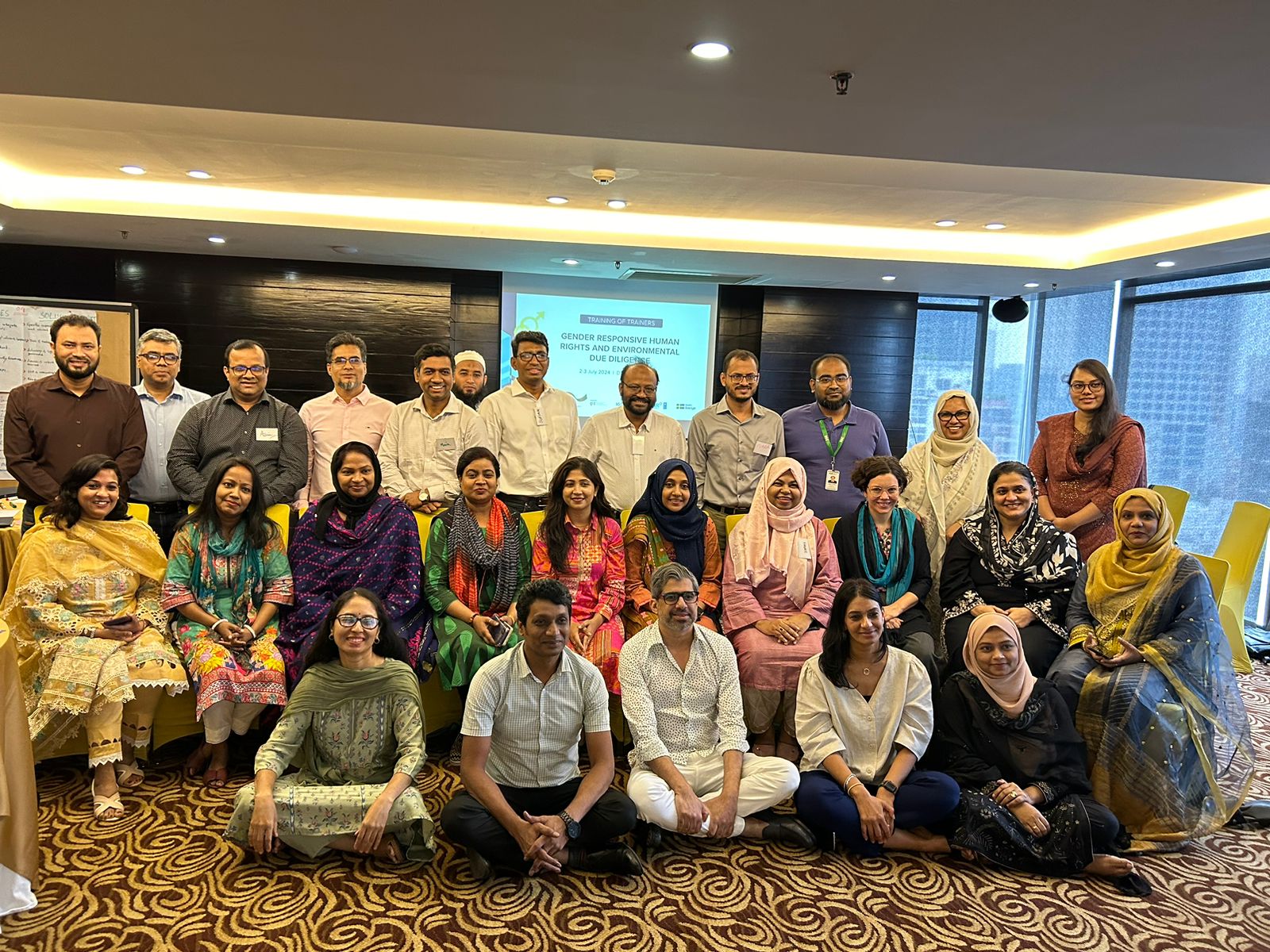
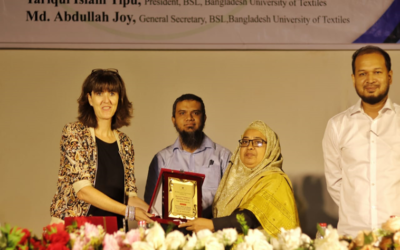
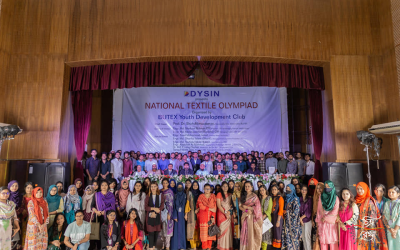

0 Comments